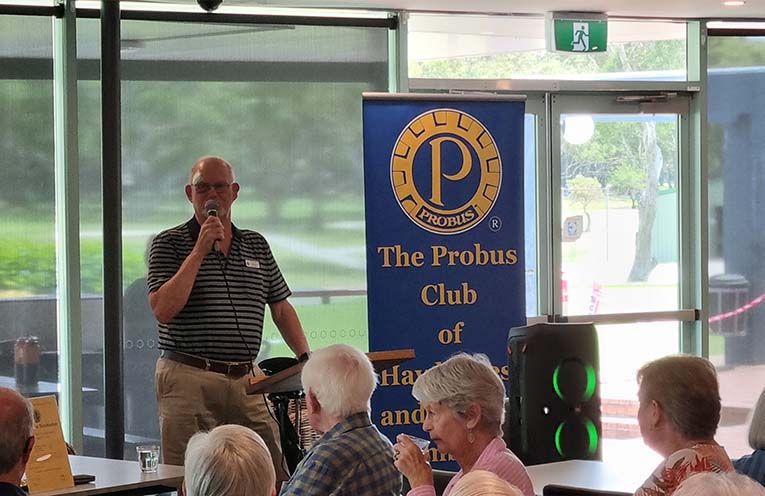
FIREFIGHTING in NSW has changed considerably, a fact that local retired Rural Fire Service (RFS) officer Keith Harrap explained to the Hawks Nest District Probus Club on Friday, 1 November.
The local social club, which now boasts close to 160 members – including Keith – heard how he started as a volunteer and ended near the top as Assistant Commissioner for nearly a decade.
 Advertise with News of The Area today.
Advertise with News of The Area today.It’s worth it for your business.
Message us.
Phone us – (02) 4981 8882.
Email us – media@newsofthearea.com.au
Keith said the RFS was started by a loose collection of farmers down near Berrigan in 1896 and was formalised in 1900 based on local government boundaries.
“I joined the St Ives Brigade in 1968, but there was no formalised training back then, you really just showed up,” he said.
“We had a big yellow Canadian tanker, probably overloaded, and the crew stood on side running boards.
“The big 1994 fires that came within 5km of the Sydney GPO prompted regulatory changes.
“In ‘94, we organised a fleet of water carriers to dump freshwater into a dry creek bed, in order to supply downstream where it was needed in a National Park.
“However, two of the tankers were brand new sewage trucks, ready to go with side labels and everything, which prompted nearby alarmed residents to complain that we were dumping sewage into the park, although that was not the case.”
By 2001 the RFS was part of the State Government, and a blossoming of the service ensued.
As an officer, Keith was sent overseas to Europe, USA, China, and South-East Asia, mostly to impart RFS training methodologies for incident management.
He described some awkward cultural encounters and how he surprised a room full of Texans by explaining that NSW was bigger than their beloved state, by more than 100,000 km².
“The USA’s methodologies were not good, they had no recognition of current competencies… a military veteran of Afghanistan had to go back and do the entire training all over again just to take a job as a firefighter,” he said.
“Our RFS is totally self-reliant, a totally self-sustaining organisation, and the input volunteers give to the management is astronomical.
“[Their efforts were] once estimated to have a value of around $2.1 trillion, based on what it would cost if all those volunteers had to be paid.”
“The RFS fleet now has 65,000 vehicles; in 2022/23 there were 25,000 incidents attended.”
Keith was awarded the ASFM (Aust Fire Service Medal) in the Queen’s Birthday Honours list of 1999, which recognises distinguished service by members of Australian fire services.
By Thomas O’KEEFE
